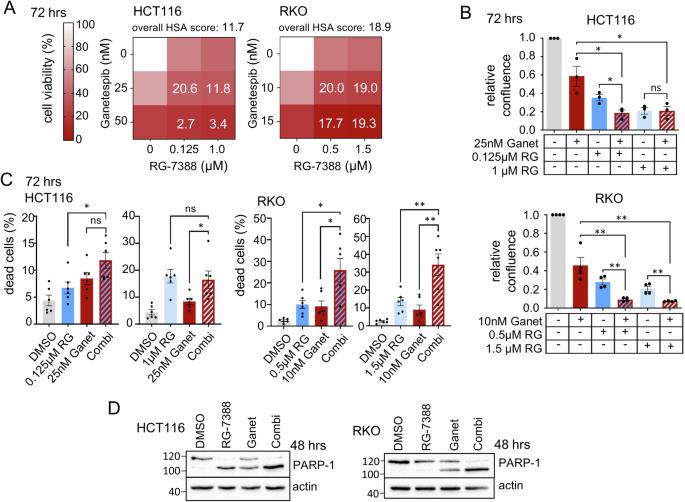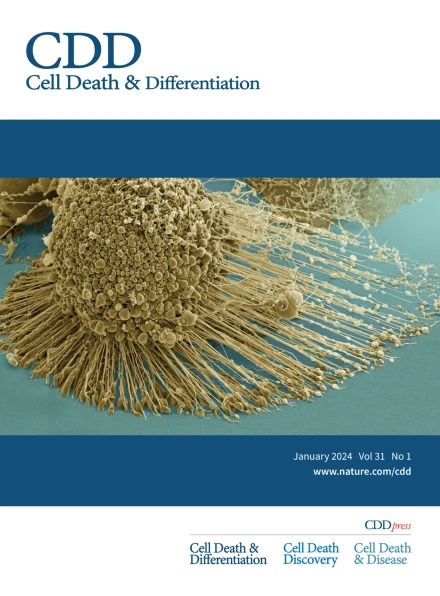通过p53激活或细胞周期抑制中断HSF1-HSP90轴增强结直肠癌治疗
IF 15.4
1区 生物学
Q1 BIOCHEMISTRY & MOLECULAR BIOLOGY
引用次数: 0
摘要
应激相关伴侣系统在癌症治疗中是一个可行的靶点。它在癌症组织中普遍上调,并通过稳定癌蛋白实现致瘤性。大多数抑制剂针对关键成分热休克蛋白90 (HSP90)。尽管HSP90抑制剂具有高度的肿瘤选择性,但它们在临床试验中失败了。这些失败部分是由于热休克反应(HSR)中的负调节反馈回路受到干扰:在对HSP90抑制的反应中,存在由转录因子热休克因子1 (HSF1)介导的应激诱导伴侣的代偿性合成。我们最近发现野生型p53通过p21-CDK4/6-MAPK-HSF1轴抑制HSF1从而降低HSR。在这里,我们测试了在基于HSP90的治疗中,p53的同时激活或直接细胞周期抑制是否会中断有害的HSF1-HSR轴,并提高HSP90抑制剂的效率。我们发现临床相关的p53激活剂Idasanutlin在基于HSP90抑制剂的治疗中抑制HSF1-HSR活性。这种组合协同降低了p53精通的结直肠癌(CRC)细胞、小鼠肿瘤源性类器官和患者源性类器官(PDOs)的细胞活力并加速了细胞死亡。在机制上,联合治疗后,结直肠癌细胞上调p53相关通路、凋亡和炎症通路。同样,在CRC小鼠模型中,双重HSF1-HSP90抑制抑制肿瘤生长并重塑免疫细胞组成。重要的是,在HSP90抑制下,细胞周期蛋白依赖性激酶4/6 (CDK4/6)的抑制在p53精通的CRC细胞中表现为HSR的协同抑制。此外,在p53缺失的CRC细胞中,HSP90抑制与CDK4/6抑制剂联合使用同样可以抑制HSF1-HSR并降低癌症生长。同样,p53突变的PDOs对双重HSF1-HSP90抑制有反应,提供了一种独立于p53状态的靶向CRC的策略。总之,我们为改进基于hsp90的治疗提供了新的选择,以增强CRC的治疗。本文章由计算机程序翻译,如有差异,请以英文原文为准。


Enhancement of colorectal cancer therapy through interruption of the HSF1-HSP90 axis by p53 activation or cell cycle inhibition
The stress-associated chaperone system is an actionable target in cancer therapies. It is ubiquitously upregulated in cancer tissues and enables tumorigenicity by stabilizing oncoproteins. Most inhibitors target the key component, heat-shock protein 90 (HSP90). Although HSP90 inhibitors are highly tumor-selective, they fail in clinical trials. These failures are partly due to interference with a negative regulatory feedback loop in the heat-shock response (HSR): in response to HSP90 inhibition, there is compensatory synthesis of stress-inducible chaperones, mediated by the transcription factor heat-shock-factor 1 (HSF1). We recently identified that wild-type p53 reduces the HSR by repressing HSF1 via a p21-CDK4/6-MAPK-HSF1 axis. Here, we test whether in HSP90-based therapies, simultaneous p53 activation or direct cell cycle inhibition interrupts the deleterious HSF1-HSR axis and improves the efficiency of HSP90 inhibitors. We found that the clinically relevant p53 activator Idasanutlin suppresses the HSF1-HSR activity in HSP90 inhibitor-based therapies. This combination synergistically reduces cell viability and accelerates cell death in p53-proficient colorectal cancer (CRC) cells, murine tumor-derived organoids, and patient-derived organoids (PDOs). Mechanistically, upon combination therapy, CRC cells upregulate p53-associated pathways, apoptosis, and inflammatory pathways. Likewise, in a CRC mouse model, dual HSF1-HSP90 inhibition represses tumor growth and remodels immune cell composition. Importantly, inhibition of the cyclin-dependent kinases 4/6 (CDK4/6) under HSP90 inhibition phenocopies synergistic repression of the HSR in p53-proficient CRC cells. Moreover, in p53-deficient CRC cells, HSP90 inhibition in combination with CDK4/6 inhibitors similarly suppresses the HSF1-HSR and reduces cancer growth. Likewise, p53-mutated PDOs respond to dual HSF1-HSP90 inhibition, providing a strategy to target CRC independent of the p53 status. In sum, we provide new options to improve HSP90-based therapies to enhance CRC therapies.
求助全文
通过发布文献求助,成功后即可免费获取论文全文。
去求助
来源期刊

Cell Death and Differentiation
生物-生化与分子生物学
CiteScore
24.70
自引率
1.60%
发文量
181
审稿时长
3 months
期刊介绍:
Mission, vision and values of Cell Death & Differentiation:
To devote itself to scientific excellence in the field of cell biology, molecular biology, and biochemistry of cell death and disease.
To provide a unified forum for scientists and clinical researchers
It is committed to the rapid publication of high quality original papers relating to these subjects, together with topical, usually solicited, reviews, meeting reports, editorial correspondence and occasional commentaries on controversial and scientifically informative issues.
 求助内容:
求助内容: 应助结果提醒方式:
应助结果提醒方式:


